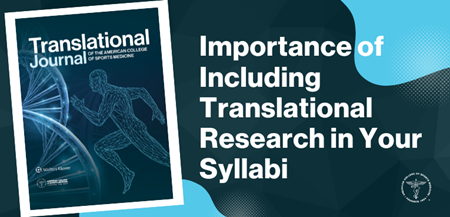Stella L. Volpe, Ph.D., RDN, FACSM, ACSM-CEP |
July
27, 2023

The phrase translational research has been used since about 1993. According to the National Institutes of Health (NIH), translational research has two parts: 1) using research conducted in the laboratory and pre-clinical studies to design trials in humans, and 2) ensuring that research is used to adopt best practices in the community. Regardless of the type of research conducted, all should ultimately lead to cost-effective methods for preventing and treating disease.
There is a spectrum of translational research. They are defined as the following:
"T0 Research: basic biomedical research, including preclinical and animal studies; not including interventions with human subjects;
T1 Research: translation to humans, including proof of concept studies, Phase 1 clinical trials, and focus on new methods of diagnosis, treatment, and prevention in highly-controlled settings;
T2 Research: translation to patients, including Phase 2 and 3 clinical trials, and controlled studies leading to clinical application and evidence-based guidelines;
T3 Research: translation to practice, including comparative effectiveness research, post-marketing studies, clinical outcomes research, health services, and dissemination & implementation research; and
T4 Research: translation to communities, including population level outcomes research, monitoring of morbidity, mortality, benefits, and risks, and impacts of policy and change."
Including translational science in the classroom will expand students’ learning and allow them to better connect basic science to community science. It also sheds light on the importance of all types of research. Sometimes, students (or faculty) who conduct one type of research may perceive that their type of research is the most important. However, all research along the translational spectrum is essential, and contributes to the prevention and treatment of disease.
In addition to teaching students about different types of research, translational science emphasizes the importance of working in teams, where different scientists all contribute to make the research even more rigorous due to the contributions of all the team members.
I have the privilege of teaching Translational Science in our department. It is a course where I bring outside speakers from around the country (including several ACSM members!), who discuss their research, and then my students discuss where everyone’s research falls on the translational spectrum. We also have some classes where students learn laboratory techniques in basic and applied sciences. Students soon realize the significance of collaboration and the translation of research.
However, you do not have to teach a translational science course to stress the importance of translational research to your students. Including articles from the Translational Journal of the American College of Sports Medicine (TJACSM) can make including translational science in your classes seamless. Note that TJACSM accepts pilot and feasibility studies as well.
The following are some recent publications in TJACSM you might consider adding to your syllabi:
Implementation Science:
Milliken et al. Bone, Estrogen, Strength Training Study Translation to Osteoporosis Prevention Research and Education.
Feasibility/Pilot Study Report:
Wu et al. HbA1c Reduction in Diabetic Older Blacks and Hispanics: A Study on Mobile Physical Activity Tracking.
Controlled Trial:
Collins et al. Demographic, Clinical, and Psychosocial Predictors of Exercise Adherence: The STRRIDE Trials.
Stella L. Volpe, Ph.D., RDN, FACSM, ACSM-CEP, is professor and head of the Department of Human Nutrition, Foods, and Exercise at Virginia Tech, Blacksburg, VA. Her degrees are in both Nutrition and Exercise Physiology; she also is an ACSM Certified Clinical Exercise Physiologist® and a registered dietitian. Dr. Volpe's research focuses on obesity and diabetes prevention using traditional interventions, mineral supplementation, altering the environment to result in greater physical activity and healthy eating as well as in sport nutrition. Dr. Volpe is chair of the ACSM American Fitness Index, and is on the Board of Trustees for the Institute for the Advancement of Food and Nutrition Sciences. Dr. Volpe is an associate editor of ACSM's Health & Fitness Journal®, the Translational Journal of the American College of Sports Medicine, and Exercise and Sport Sciences Reviews. She is ACSM President-elect (2023-2024).
Are you a faculty member looking for more classroom insights and tools? Subscribe to the ACSM Faculty newsletter to be the first to learn about new resources and content like this blog.